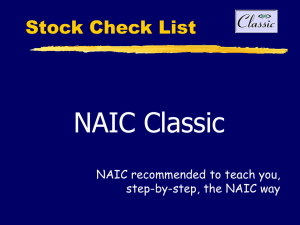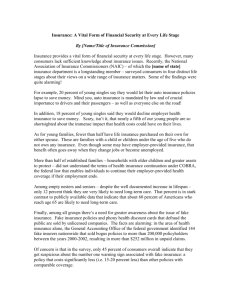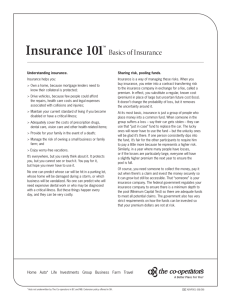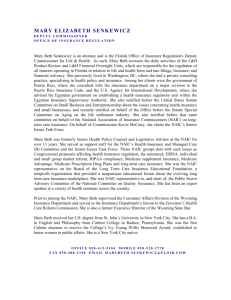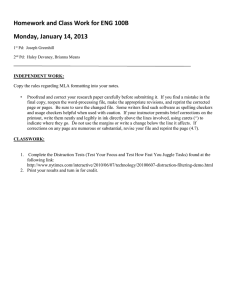Reprint for Not A Consumer’s Guide
advertisement
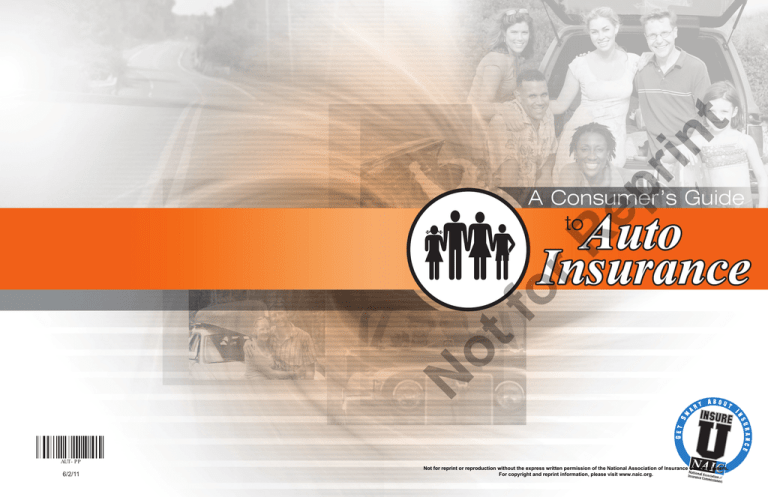
t rin ep N ot fo rR A Consumer’s Guide AUT- PP 6/2/11 Not for reprint or reproduction without the express written permission of the National Association of Insurance Commissioners. For copyright and reprint information, please visit www.naic.org. About the NAIC … rR ep rin t The National Association of Insurance Commissioners (NAIC) is the oldest association of state government officials. Its members consist of the chief insurance regulators in all 50 states, the District of Columbia and five U.S. territories. The primary responsibility of the state regulators is to protect the interests of insurance consumers, and the NAIC helps regulators fulfill that obligation in a number of different ways. This guide is one example of work done by the NAIC to assist states in educating and protecting consumers. Another way the NAIC lends support to state regulators is by providing a forum for the development of uniform public policy when uniformity is appropriate. It does this through a series of model laws, regulations and guidelines, developed for the states’ use. States that choose to do so may adopt the models intact or modify them to meet the needs of their marketplace and consumers. The NAIC’s mission is to assist state insurance regulators, individually and collectively, in serving the public interest and achieving the following fundamental insurance regulatory goals in a responsive, efficient and cost effective manner, consistent with the wishes of its members: • Protect the public interest; • Promote competitive markets; • Facilitate the fair and equitable treatment of insurance consumers; • Promote the reliability, solvency and financial solidity of insurance institutions; and • Support and improve state regulation of insurance. fo NAIC Executive Office 444 North Capitol Street NW, Suite 701 Washington, DC 20001 Phone: 202-471-3990 N ot NAIC Central Office 2301 McGee Street, Suite 800 Kansas City, MO 64108-2604 Phone: 816-842-3600 NAIC Capital Markets & Investment Analysis Office 48 Wall Street, 6th Floor New York, NY 10005-2906 Phone: 212-398-9000 www.naic.org Not for reprint or reproduction without the express written permission of the National Association of Insurance Commissioners. For copyright and reprint information, please visit www.naic.org. t rin rR ep A Consumer’s Guide to N ot fo AUTO INSURANCE Not for reprint or reproduction without the express written permission of the National Association of Insurance Commissioners. For copyright and reprint information, please visit www.naic.org. t The NAIC is the authoritative source for insurance industry information. Our expert solutions support the efforts of regulators, insurers and researchers by providing detailed and comprehensive insurance information. The NAIC offers a wide range of publications in the following categories: Statistical Reports Insurance industry data directed at regulators, educators, financial analysts, insurance industry members, lawyers and statisticians. Consumer Information Consumers, educators and members of the insurance industry will find important answers to common questions in guides about auto, home, health and life insurance. Supplementary Products Accountants, educators, financial analysts, insurers, lawyers and statisticians will find guidelines, handbooks, surveys and NAIC positions on a wide variety of issues. Financial Regulation Accountants, financial analysts and lawyers will find handbooks, compliance guides and reports on financial analysis, state audit requirements and receiverships. Securities Valuation Office Provides insurers with portfolio values and procedures for complying with NAIC reporting requirements. rR ep rin Accounting & Reporting Accountants, members of the insurance industry and educators will find relevant information about statutory accounting practices and procedures. Legal State laws, regulations and guidelines apply to members of the legal and insurance industries. fo NAIC Activities Insurance industry members will find directories, newsletters and reports affecting NAIC members. For more information about NAIC publications, view our online catalog at: http://store.naic.org N ot Special Studies Accountants, educators, financial analysts, members of the insurance industry, lawyers and statisticians will find relevant products on a variety of special topics. White Papers Accountants, members of the insurance industry and educators will find relevant information on a variety of insurance topics. © 2011 National Association of Insurance Commissioners. All rights reserved. Printed in the United States of America No part of this book may be reproduced, stored in a retrieval system, or transmitted in any form or by any means, electronic or mechanical, including photocopying, recording, or any storage or retrieval system, without written permission from the NAIC. NAIC Executive Office NAIC Central Office NAIC Capital Markets & 444 North Capitol Street, NW 2301 McGee Street Investment Analysis Office Suite Suite 800 48Insurance Wall Street, 6th Floor Not701 for reprint or reproduction without the express written permission of the National Association of Commissioners. Washington, DC 20001 Kansas City, MO please 64108 visit www.naic.org. New York, NY 10005-2906 For copyright and reprint information, 202.471.3990 816.842.3600 212.398.9000 A Consumer’s Guide to Auto Insurance This guide provides information on how to make decisions when you buy automobile insurance. You have a choice in coverages and prices will differ between insurance companies. Table of Contents t Why You Need Auto Insurance . . . . . . . . . . . . . . . . . . . . . . . . . . . . . . . .1 rin Coverages in an Auto Policy . . . . . . . . . . . . . . . . . . . . . . . . . . . . . . . . . .1 How Insurers Determine Your Premium . . . . . . . . . . . . . . . . . . . . . . . .3 ep Smart Shopping . . . . . . . . . . . . . . . . . . . . . . . . . . . . . . . . . . . . . . . . . . . .5 Getting Premium Quotes . . . . . . . . . . . . . . . . . . . . . . . . . . . . . . . . . . . . .6 Your Responsibilities . . . . . . . . . . . . . . . . . . . . . . . . . . . . . . . . . . . . . . . .7 rR If You’re Involved in an Accident . . . . . . . . . . . . . . . . . . . . . . . . . . . . .8 Filing a Claim . . . . . . . . . . . . . . . . . . . . . . . . . . . . . . . . . . . . . . . . . . . . . .9 Losing Your Insurance . . . . . . . . . . . . . . . . . . . . . . . . . . . . . . . . . . . . . . .9 fo What to Do if You Can’t Find Insurance . . . . . . . . . . . . . . . . . . . . . . .10 N ot For More Information . . . . . . . . . . . . . . . . . . . . . . . . . . . . . . . . . . . . . .10 Not for reprint or reproduction without the express written permission of the National Association of Insurance Commissioners. For copyright and reprint information, please visit www.naic.org. © 2011 National Association of Insurance Commissioners t rin ep rR fo ot N Not for reprint or reproduction without the express written permission of the National Association of Insurance Commissioners. For copyright and reprint information, please visit www.naic.org. A Consumer’s Guide to Auto Insurance Why You Need Auto Insurance Auto insurance is an important purchase for most drivers. There are three main reasons to buy auto insurance. t Why You Need Auto Insurance 1. To comply with state laws Most states have auto insurance requirements. If you drive without insurance, you could be fined, and your vehicle could be impounded. rin 2. To satisfy your lender 3. To protect your assets ep If you have a car loan, most lenders require you to have insurance to protect their interest in your car. If you let your insurance lapse, your lender will likely have your car insured. The premium may be much higher (and the coverage much less) than a policy you would buy on your own. The lender can require you to pay this higher premium until you get your own auto insurance. fo rR Auto insurance can provide bodily injury and property damage liability coverage for accidents that happen to others for which you are responsible. Liability insurance also will pay the cost of an attorney to protect you if you’re sued. The state-required minimum coverages are usually not enough to fully protect you and your assets. Auto insurance also may cover the cost of accident-related repairs to your insured car, as well as your accident-related medical bills and lost wages. Coverages in an Auto Policy ot An auto insurance policy usually has several types of protections or “coverages” — some required and some optional. Some coverages may automatically be part of your policy unless you opt out of them. You must decide what coverages best fit your needs, which may mean choosing more coverages than you need to meet requirements. N Your auto policy may include the following coverages. Each coverage is usually priced separately. Required by State Law • Bodily Injury Liability This coverage applies to injuries that you cause to someone else. You and family members listed on the policy also are covered when driving someone else’s car with their permission. Not for reprint or reproduction without the express written permission of the National Association of Insurance Commissioners. For copyright and reprint information, please visit www.naic.org. © 2011 National Association of Insurance Commissioners 1 A Consumer’s Guide to Auto Insurance • Property Damage Liability This coverage pays for damages you cause to someone else’s car or to objects and structures your car hits. • Uninsured and Underinsured Motorist Coverage rin t Uninsured motorist coverage reimburses you if an uninsured or a hit-and-run driver hits you. Underinsured motorist coverage pays when an at-fault driver doesn’t have enough insurance to fully pay for your loss. • Medical Payments or Personal Injury Protection (PIP) ep This coverage pays for treating injuries to you and your passengers. Personal Injury Protection (PIP), which is available in “no-fault” states, can also cover lost wages and funeral costs. fo rR No-fault. If you live in a no-fault state, your own insurance company pays for injuries to you and your passengers regardless of who’s at fault. Most no-fault states also let you sue the at-fault driver if you have serious injuries. However, you still must file a claim with the at-fault driver’s insurance company to be paid for damage to your vehicle. Required by Your Lender if You Have an Auto Loan • Collision This coverage pays for damage to your car from a collision with another car, an object or a pothole or from flipping over. ot Coverages in an Auto Policy Required by Law in Some States N • Comprehensive This coverage reimburses you for damage to your car that’s not caused by a collision. This includes theft, hail, windstorm, flood, fire and hitting animals. Comprehensive coverage also will reimburse you if your windshield is pitted, cracked or damaged. Some companies won’t charge you a deductible for windshield repairs. Most insurers offer many other types of coverage, such as for towing and rental car when your car is disabled. Each type of coverage likely will increase your premium so consider carefully what you need. Not for reprint or reproduction without the express written permission of the National Association of Insurance Commissioners. For copyright and reprint information, please visit www.naic.org. 2 © 2011 National Association of Insurance Commissioners A Consumer’s Guide to Auto Insurance Most auto policies don’t cover equipment — including stereos, CD players, navigation systems and cell phones — not permanently installed in your car, or maintenance for your car. t Determining Your Premium Auto insurance doesn’t cover paying off your loan if your car is damaged and its market value is less than what you owe. Auto dealers and lenders may offer guaranteed auto protection (GAP) insurance for this purpose. rin Your auto insurance will cover you if you drive into Canada. To drive into Mexico, however, you’ll need to buy Mexican auto insurance. Ask your insurer about other requirements. • • • • • Motorcycles All-Terrain Vehicles (ATVs) Off-Road Vehicles RVs Commercial Vehicles rR How Insurers Determine Your Premium ep You’ll likely need a separate insurance policy for these types of vehicles: Many factors affect the premium you pay, including which insurance company you choose. Different insurance companies use different methods to rate their risk of insuring you and charge different premiums for similar coverage. fo These items will likely affect your premium: • Your driving record, and the driving records of others covered by your insurance policy, during the last three to five years. N ot • Your credit-based insurance score. Those with better scores often pay lower premiums. Some states restrict the ways insurers can use credit-based insurance scores and several states ban their use. If you’ve had a hardship which may have hurt your credit history, ask your insurer if it will consider a life event exception. Credit-based insurance scoring. Most insurers use the information in your credit report to calculate a credit-based insurance score. They do this because studies show a correlation between this score and the likelihood of filing a claim. Credit-based insurance scores are different from other credit scores. Not for reprint or reproduction without the express written permission of the National Association of Insurance Commissioners. For copyright and reprint information, please visit www.naic.org. © 2011 National Association of Insurance Commissioners 3 A Consumer’s Guide to Auto Insurance rin t • The type of vehicle you drive. Generally, you’ll pay more for insurance, particularly for comprehensive and collision coverages, if your vehicle is newer or more expensive. Sports cars and high-performance vehicles also cost more to insure because they’re involved in more accidents and thefts and cost more to repair. If you drive a large SUV or truck, which can cause more serious damage in an accident, you could pay more for liability coverage. ep • Where you live. Urban areas usually have more accidents and auto thefts than rural areas. • Vehicle use, including your annual mileage. rR • Your prior insurance coverage. Most insurance companies will charge you more if you don’t have auto insurance when you apply for coverage. Some also charge you more if you currently have only the state-required minimum amounts of coverage. fo • Previous claims. Most insurance companies report your auto claims to one or more private nationwide claim databases (such as the Comprehensive Loss Underwriting Exchange—CLUE). Insurance companies use these databases to see the claims you’ve submitted in the past. You have a right to a free copy of your CLUE report. • The limits you choose for liability coverage. • The deductibles you choose for comprehensive and collision coverages. N ot Determining Your Premium • Your age, gender and marital status. People under 25, males, single people and families with young drivers in the household tend to have more accidents and therefore pay higher premiums. Accident rates (and premiums) also tend to increase for people over age 65. Insurance companies can base premiums on all insured drivers in your household, including those not related by blood, such as roommates. A deductible is the amount you have to pay out-of-pocket on a claim before the policy pays the loss. Higher policy deductibles mean lower policy premiums. A policy with a $1,000 deductible has a lower premium than the same policy with a $500 deductible. Having a higher deductible is a good way to save money on your auto insurance premium and to submit fewer claims. But be sure you can afford the deductible in case you have a loss. Not for reprint or reproduction without the express written permission of the National Association of Insurance Commissioners. For copyright and reprint information, please visit www.naic.org. 4 © 2011 National Association of Insurance Commissioners A Consumer’s Guide to Auto Insurance Discounts Most insurance companies offer various types of discounts. Ask the agent if there’s a discount for: • Insuring your auto and your home with the same insurance company. • Insuring multiple vehicles with the same insurance company. t • Protection devices such as airbags, anti-lock brakes and anti-theft devices. rin • Taking a defensive driving course, particularly if you’re 55 or older. ep Smart Shopping rR Different insurance companies charge different rates for the same coverage. Also, not all insurance companies provide the same level of claims service. So, it makes sense to shop around for the best insurance company for your needs. Insurance companies use one of three methods to sell their products. • Independent agents represent several companies and can give you several quotes. fo • Exclusive agents only sell the products of one insurance company. • Direct market sales are done over the Internet or by mail or telephone. ot The insurer—not you—usually pays the agent. The insurer may pay the agent a percentage of your premium as a commission. An agent who is salaried may receive bonuses for sales. Smart Shopping • Being a member of an organization or working for certain employers. N You can find insurance companies and agents by asking friends and neighbors, browsing the Internet, looking through the phone book, or in ads in the newspaper, on the radio and on television. You should also ask your state insurance department if it publishes premium comparison guides for auto insurance. Customer service is important to most consumers, particularly when they have a claim. A complaint index gives you a sense of how well an insurer serves its customers. Many state insurance departments post complaint indexes on their websites. A complaint index measures how many complaints your state insurance department receives relative to the size of the company. Not for reprint or reproduction without the express written permission of the National Association of Insurance Commissioners. For copyright and reprint information, please visit www.naic.org. © 2011 National Association of Insurance Commissioners 5 A Consumer’s Guide to Auto Insurance It’s illegal for unlicensed insurance companies or agents to sell insurance. Business cards and websites aren't proof that an agent is licensed. If you buy insurance from an unlicensed agent or company it may not pay your claims or, if you cancel your policy, it may not refund your premiums. To find out if an agent or company is licensed, check with your state insurance department. t rin Getting Premium Quotes ep The way to compare different companies’ prices is to get premium quotes. But first you should decide what coverages and policy limits you need. An agent can help you with this. rR State law sets the minimum amounts of liability coverage required. These minimums are too low to fully cover you if you cause a serious accident. Most insurers let you buy higher amounts or “limits” of liability coverage, often without much increase in your premium. fo When you get quotes be sure to ask for the same coverages and limits and give the same information to each agent or company. Auto insurers may use all of the factors listed in the “How Insurers Determine Your Premium” section (and maybe more) to price your policy. The insurer needs quite a bit of information to price your policy, usually including your Social Security number and your vehicle’s VIN (vehicle identification number). The premium for your insurance may be different from the quote you initially receive for several reasons. For example, if you told the company or its agent that you have a perfect driving record and you don’t, your premium will be higher than your quote. Be sure to get rate quotes and coverage information in writing. ot Getting Premium Quotes You also want to buy insurance from a company that’s financially sound. You can check the financial health of an insurance company by using ratings from independent ratings agencies, such as Standard and Poor’s, A.M. Best and Moody’s. Make sure you ask about discounts. Also be sure to find out how much your premium will change if you choose different deductibles. N While you’re getting quotes, you should also ask the agent some of these questions: • Are the agent and the insurance company licensed by my state insurance department? (Your state insurance department can confirm this.) • What limits are available? • What coverage does state law require me to buy? What coverage will a lender require if I have a car loan? Not for reprint or reproduction without the express written permission of the National Association of Insurance Commissioners. For copyright and reprint information, please visit www.naic.org. 6 © 2011 National Association of Insurance Commissioners A Consumer’s Guide to Auto Insurance • Should I buy comprehensive and/or collision coverage? (Compare the premium to what your car is worth.) If so, what deductibles can I choose? • What doesn’t my policy cover? • What is the deductible for uninsured and underinsured motorist coverage? • How will my driving record affect my premium? t Your Responsibilities • How will my credit history affect my premium? rin • If I’m in an accident and it wasn’t my fault, how will this affect my insurance? (In some states, insurers can’t charge you a higher premium because of accidents that weren’t your fault.) ep • If I’m in an accident and it was my fault, how will this affect my insurance? • If I have an accident, can I use my own repair shop? rR • If I let someone who doesn’t live in my home drive my car, am I covered? Am I covered if I drive someone else’s car? • If my child is away at school, is s/he covered? • If I rent a car, will my policy cover me? fo Your Responsibilities An automobile insurance policy is a legal contract. It explains your rights and responsibilities and those of the insurance company. Keep your policy in your home files and know the name of your insurer. ot You should read your policy and be sure you understand it. If you have questions about your insurance policy, contact your insurance agent or company. N When you buy auto insurance, you’ll receive a policy, not a photocopy. If you don't receive a policy within 30 days, contact the insurance company. If you need a company's toll-free number, check their website, call your agent or contact your state insurance department. Other helpful tips: • Pay the premium on time. Some insurers don’t accept late payments. If an insurer accepts your payment late, it may increase your premium at renewal. Not for reprint or reproduction without the express written permission of the National Association of Insurance Commissioners. For copyright and reprint information, please visit www.naic.org. © 2011 National Association of Insurance Commissioners 7 A Consumer’s Guide to Auto Insurance • Your full premium is due when your policy starts, which is usually every six months. Many insurance companies will let you pay monthly. To do this, you’ll likely pay an extra fee. rin t • Keep a file of all paperwork you completed online or received in the mail and signed, including the policy, changes to your policy, renewal notices, correspondence, copies of advertisements, premium payment receipts, notes of conversations and any claims submitted. If You’re Involved in an Accident ep • Maintain your auto. You’re responsible for its upkeep and repair (including maintenance) to keep it in good condition. rR If you’re involved in an accident you should exchange information with the other driver. Get their name and address and their insurance company’s name and phone number. This information is on the proof-of-insurance card in their auto. If you can’t get this information, write down their driver’s license number and license plate number to give to your insurance company. Be prepared to share the same information about yourself with the other driver. • Call 911 if someone’s injured. fo • If your car is drivable, move it out of traffic. • Get this important information at the accident scene: o The other car’s make, model, year and license plate number. o Witnesses’ names and contact information. o The name, badge number, and contact information for the officer who comes to the accident. Ask the officer when and where to get the accident report and accident report number. o The time, date and exact location of the accident, with notes of skid marks, weather and road conditions. Take a photo or sketch a diagram of the accident scene. N ot If You’re in an Accident • Keep your proof-of-insurance card in your car at all times; most states require this. • If your car is damaged by a hit-and-run driver or is stolen, promptly call the police. Not for reprint or reproduction without the express written permission of the National Association of Insurance Commissioners. For copyright and reprint information, please visit www.naic.org. 8 © 2011 National Association of Insurance Commissioners A Consumer’s Guide to Auto Insurance Filing a Claim Read your policy! It’s your guide to the types of losses that will and will not be covered and to filing claims. How often you file a claim and the types of claims you file often affect your premium and whether your insurer will renew your policy. If the cost to repair the damage is not much more than your deductible, you may want to pay for the repairs without filing a claim. ep The insurance company will assign a claims adjuster to assess the damages and determine the payment. These adjusters may be employees of the company or independent contractors. You should cooperate with the adjuster’s investigation of your claim. The adjuster will probably want to meet with you to inspect the damage. Jot down notes and keep track of the dates of any conversations you have with your agent or adjuster. rR If you, the insurer and the claims adjuster disagree, first try to resolve the differences with your insurer. Your agent may be helpful. It also might help to have your auto repairer meet with you and the insurance adjuster. Don’t feel rushed or pushed to agree with something you aren’t comfortable with; your insurer doesn’t have the last word. Ask questions and ask the adjuster to provide a written explanation of his decisions. fo If you and the insurer still disagree about the claim handling or settlement, you should ask for help from the consumer services personnel at your state insurance department. If you disagree about the value of the claim, check your policy for an appraisal clause. N ot Another option is to hire an attorney or a public adjuster. A public adjuster isn’t an attorney or a government employee. Those states that allow public adjusters require them to be licensed and to follow certain guidelines. If you have questions about public adjusters in your state, contact your state insurance department. Filing a Claim rin t To file a claim, call the phone number on your proof-of-insurance card as soon as possible. Ask about forms or documents you’ll need to support your claim. Each state has its own laws about the claims process, and both you and your insurer will need to follow those rules. Losing Your Insurance There’s a big difference between an insurance company cancelling your policy and not renewing it. Cancellation means either you or your insurance company stop the coverage before the policy’s normal expiration date. You can always cancel your policy for any reason. In most states, when you’re a new policyholder, your insurance company can cancel your policy for any reason, but only for a limited time (typically 60 days). After that, Not for reprint or reproduction without the express written permission of the National Association of Insurance Commissioners. For copyright and reprint information, please visit www.naic.org. © 2011 National Association of Insurance Commissioners 9 A Consumer’s Guide to Auto Insurance there’s a limited number of reasons a company can cancel you, typically only if you don’t pay your premium or if you were dishonest on your application. rin t Non-renewal means the company refuses to renew your policy after it expires. The expiration date is on your policy. Insurance companies generally have the right to not renew your policy. If your company chooses to not renew your policy, it must give you notice before your policy expires; the number of days (typically 30) varies by state. You should ask the insurer for the reason, which state regulation may limit. You also may choose to not renew your auto policy. ep If your insurance is canceled or non-renewed and you don’t agree with the insurance company’s explanation, contact your state insurance department for advice. What to Do if You Can’t Find Insurance rR If you’ve shopped around and still can’t find insurance, contact your state insurance department. Ask if your state has an insurance program for high-risk drivers. For More Information fo • Visit your state insurance department website, which you can find at www.naic.org/state_web_map.htm. Here you might find important information about your consumer rights, as well as auto insurance premium comparisons and data about complaints filed against insurers. • Visit the National Association of Insurance Commissioners (NAIC) website for consumers: www.naic.org/index_consumer.htm. ot Losing Your Insurance If your insurance company cancels your policy, it must give you advance notice. The number of days’ notice varies by state. If you or the insurer cancels your policy, the company may refund part of your premium. N • For your free annual credit report go to www.annualcreditreport.com or call 877.322.8228. Check your credit report and correct any errors before you apply for insurance. • For your free annual CLUE report go to www.choicetrust.com or call 866.312.8076. Check your CLUE report and correct any errors before you apply for insurance. Not for reprint or reproduction without the express written permission of the National Association of Insurance Commissioners. For copyright and reprint information, please visit www.naic.org. 10 © 2011 National Association of Insurance Commissioners t rin ep rR fo ot N Not for reprint or reproduction without the express written permission of the National Association of Insurance Commissioners. For copyright and reprint information, please visit www.naic.org. t rin ep rR fo ot N AUT- PP Not for reprint or reproduction without the express written permission of the National Association of Insurance Commissioners. For copyright and reprint information, please visit www.naic.org. 6/2/11 A Consumer’s Guide
